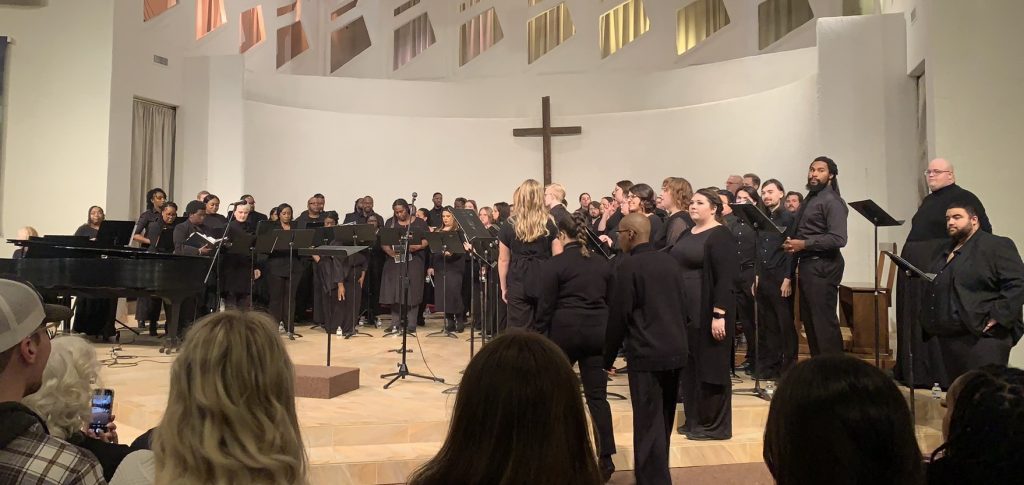
On Nov. 5, 2023, composers Dr. Nicholas Reeves and Isaac Cates and conductor Dr. Anthony Maglione presented the world premiere of “The Canon for Racial Reconciliation”.
About The Canon
The Canon was commissioned by William Jewell College in 2020 shortly after protests surrounding the death of George Floyd. The concert program describes that the music seeks to “[fuse] the traditions of the Black Church and Orthodox Christianity,” and is the first piece of its kind. The work was set for two choirs: Cardinalis, which is composed of William Jewell College’s top choral students and professional singers from the Kansas City metro area; and Ordained, led by director of music outreach at the Church of the Resurrection Isaac Cates.
The concert program briefly summarizes the piece’s objective in the tagline, “Glory to God for all the flowers in His garden.” Meaning humans represent many different types of flowers; while each one is different, every flower is valuable.
Musical Style
The piece combines two distinct musical styles: that of traditional choral music and that of traditionally Black churches. It weaves these two together with great success. The traditional choral pieces relied heavily on piano, violin and trumpet; the Black church pieces involved significant audience engagement. Composer Nicholas Reeves used a sampler to great effect, overlaying disparate elements such as rushing water or a Martin Luther King, Jr. speech. “We found ways to bring the traditions, the sounds, the oral traditions all together,” Cates told KCUR. “Even the composing of the piece, I think, is reconciliatory.”
Can art achieve reconciliation?
The day after the concert, the creators of the Canon sat down at the Oxbridge Symposium of Race and Art, an event hosted by Oxbridge senior tutor Dr. Elizabeth Sperry. The question being discussed was, “To what extent, if at all, can art promote racial reconciliation?”
All three creators agreed that art could take a significant role in racial reconciliation. “Part of reconciliation,” Mr. Cates noted, “is saying people’s names.” The Canon sought to do that from the outset. Thus, on the first page of the program, Dr. Reeves highlights the significance of American composer Eva Jessye in the Canon. Miss Jessye compiled “My Spirituals”, which is a collection of authentically sourced spirituals. “Jessye’s arrangements,” writes Reeves, “are heard as melodic extractions, the harmonic foundation, or direct quotations. In effect, Eva Jessye becomes the third composer of the ‘Canon.’”
Sourcing music authentically, though, does not assist in reconciliation if the art is not genuine. According to Cates, “For art to be genuine, it has to be lived in. Empathy can start with just learning [about] each other.”
Reeves observed that the Canon “allowed people to connect at a human level,” and Maglione agreed. Dr. Maglione “believe[s that] if everyone sang in choir, maybe they’d all learn how to listen to each other.”
Reconciliation begins with empathy and connection; if there is no connection between people, racist stereotypes can continue. The first step in reconciliation is realization—the realization that all of us are human. We must first humanize the dehumanized, lift up the downtrodden and examine our internal biases. Then, we are able to ask a question of justice. Reconciliation requires both.
